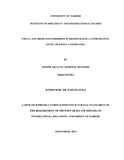| dc.description.abstract | The Small and Medium Enterprises (SMEs) dominate private sector enterprises in all the
East African States. The SME sector in the region is considered as the engine of
economic growth. The sector requires to be supported by a good trade development
policy and other support systems. The Small and Medium Enterprises face numerous
challenges during the initial stages of establishment and even as they develop. The SME
challenges in Kenya and Rwanda manifest differently. Unique challenges such as lack of
confidence in leadership, economic insecurity, evolving and shifting governance
structures have indirectly impacted negatively in the SMEs establishment and
development both in Kenya and Rwanda. However the two countries are at different
policy, legal and regulatory framework dispensations. The prevailing business
environment in each country directly affects the performance of Small and Medium
Enterprises. There is need therefore to critically examine the business environment and
sector performances in both countries with a view of finding out the circumstances
behind either success or failure of SMEs. The study sought to examine and compare the
business environment and the challenges facing the SME sectors in Kenya and Rwanda
to establish what influences the sector performance. The objectives were to: examine the
challenges facing the SME sector in Rwanda; examine the challenges facing the MSE
sector in Kenya; and compare and contrast business environment and SME sector
performance in Kenya and Rwanda. The findings may be used by policy makers of
Kenya and Rwanda in finding ways of creating a favorable and supportive business
environment for small and medium enterprises in both countries. Academia also will find
the findings beneficial. The study employed both qualitative and quantitative research
designs. Data was gathered through interviews, group discussions, reviewing of printed
materials and electronic documents. In Rwanda, the study found that Rwanda has
developed a more holistic business environment but it has taken the SMEs time to
internalize the environment for their own establishment and development. It revealed that
it requires more than a good policy, legal and regulatory framework for a vibrant SME
sector to develop. In Kenya, it found that despite the unfavorable business environment
existing in Kenya, there is a growing SME sector. It established that other non-policy
support interventions and societal attributes and endowments are some of the crucial
ingredients for a strong SME sector development. The study found that that there are
common challenges in the two countries SME sectors such as lack of skills and expertise,
inadequate information and capacity to analyze market information, access to credit and
poor sector coordination and lack of quality control in Standard of products developed
by the sector. The study recommends common and unique challenges should be
addressed through sectoral specific policies and strategies. The study further recommends
that the future work in SME and entrepreneurial development should examine in more
detail the interplay between public governance such as country specific institutional
factors and the societal role in developing entrepreneurship. | en_US |

